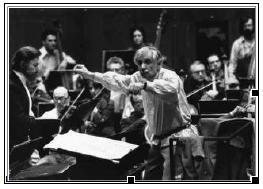|
 Bernstein,
Leonard (1918-90), American composer, conductor, and pianist, born
in Lawrence, Massachusetts, and educated at Harvard University and
at the Curtis Institute of Music, Philadelphia. He studied composition
under Walter Piston and conducting under Fritz Reiner and Serge Koussevitzky.
In 1943 Bernstein made his conducting debut, leading the New York
Philharmonic Society Orchestra in place of the indisposed Bruno Walter.
Bernstein was music director of the New York City Symphony (1945-1948),
taught at the Berkshire Music Center (1948-1955) and at Brandeis University
(1951-1956), and directed the New York Philharmonic (1958-1969). On
his retirement in 1969 he was made laureate conductor for life. Bernstein's
eclectic and passionate compositions were created in an astonishing
variety of forms; they range from three symphonies to the musicals
On the Town (1944), Wonderful Town (1953), and West Side Story (1957).
He also composed the operetta Candide (1956); the opera Trouble in
Tahiti (1952), later expanded to A Quiet Place (1984); Chichester
Psalms (1965), for chorus and orchestra; the ballets Fancy Free (1944)
and The Dybbuk Variations (1974); Mass (1971), for "singers, dancers,
and players"; and the song cycle Arias and Barcarolles (1989). In
1985 he received a Grammy Lifetime Achievement Award. Bernstein's
writings include The Joy of Music (1959); Young People's Concerts
for Reading and Listening (text and records, 1962, revised 1970),
adapted from his television show of the same name; The Infinite Variety
of Music (1966); and The Unanswered Question (1976), the text of lectures
he had delivered at Harvard. Bernstein,
Leonard (1918-90), American composer, conductor, and pianist, born
in Lawrence, Massachusetts, and educated at Harvard University and
at the Curtis Institute of Music, Philadelphia. He studied composition
under Walter Piston and conducting under Fritz Reiner and Serge Koussevitzky.
In 1943 Bernstein made his conducting debut, leading the New York
Philharmonic Society Orchestra in place of the indisposed Bruno Walter.
Bernstein was music director of the New York City Symphony (1945-1948),
taught at the Berkshire Music Center (1948-1955) and at Brandeis University
(1951-1956), and directed the New York Philharmonic (1958-1969). On
his retirement in 1969 he was made laureate conductor for life. Bernstein's
eclectic and passionate compositions were created in an astonishing
variety of forms; they range from three symphonies to the musicals
On the Town (1944), Wonderful Town (1953), and West Side Story (1957).
He also composed the operetta Candide (1956); the opera Trouble in
Tahiti (1952), later expanded to A Quiet Place (1984); Chichester
Psalms (1965), for chorus and orchestra; the ballets Fancy Free (1944)
and The Dybbuk Variations (1974); Mass (1971), for "singers, dancers,
and players"; and the song cycle Arias and Barcarolles (1989). In
1985 he received a Grammy Lifetime Achievement Award. Bernstein's
writings include The Joy of Music (1959); Young People's Concerts
for Reading and Listening (text and records, 1962, revised 1970),
adapted from his television show of the same name; The Infinite Variety
of Music (1966); and The Unanswered Question (1976), the text of lectures
he had delivered at Harvard.
|